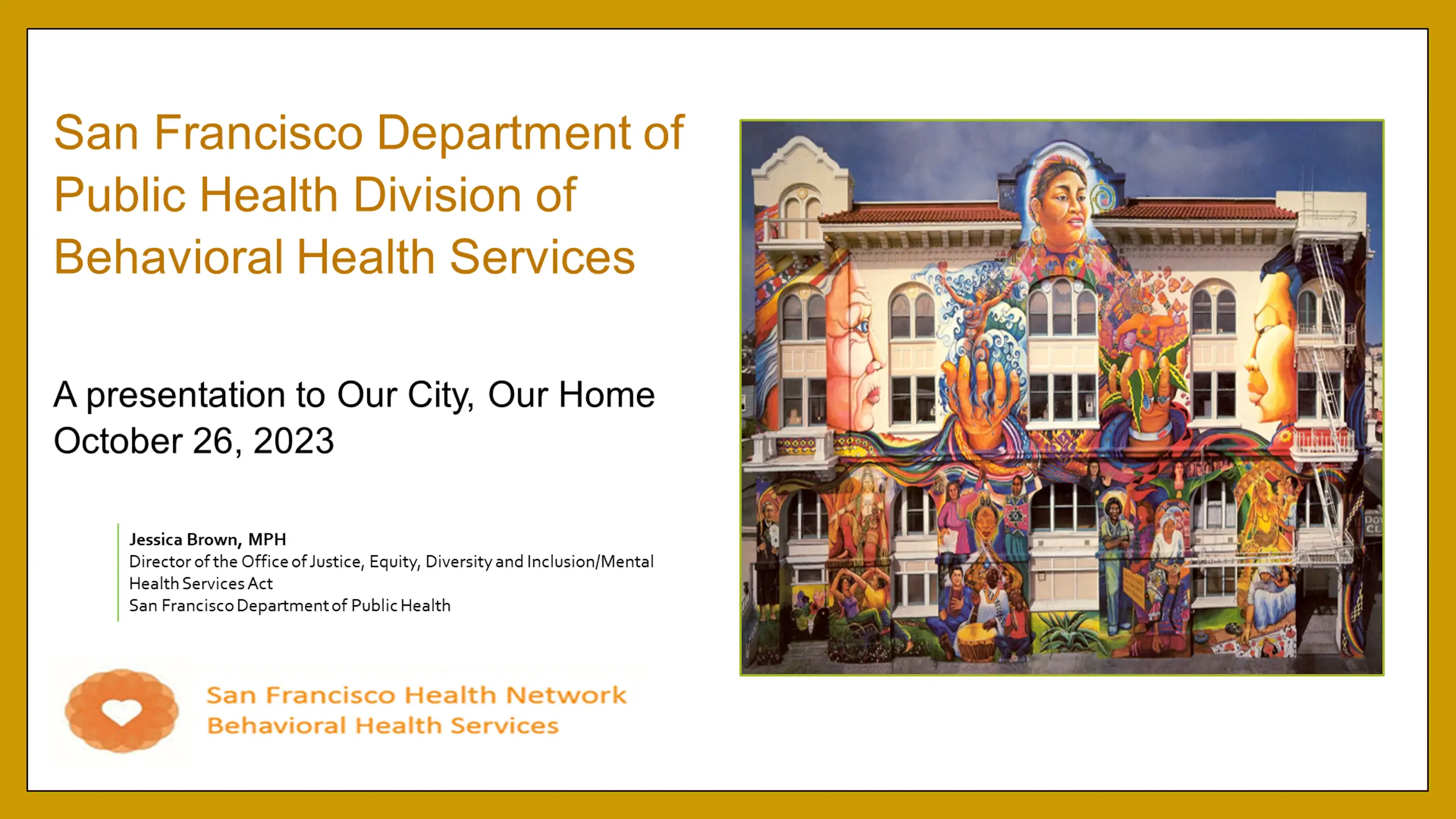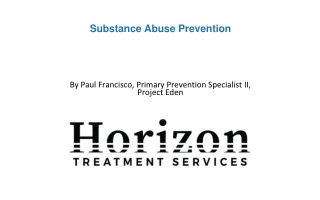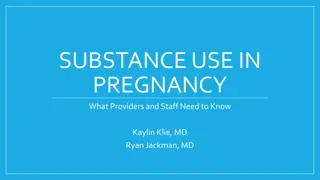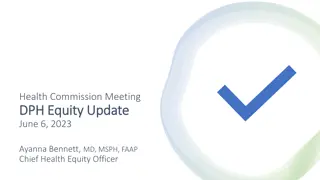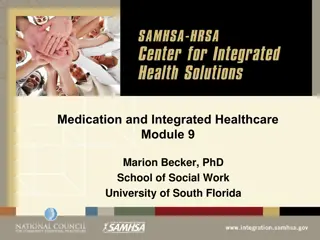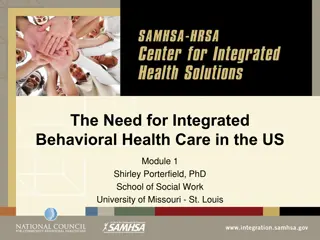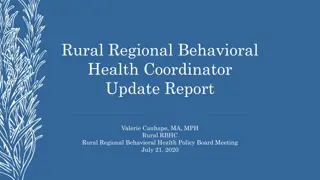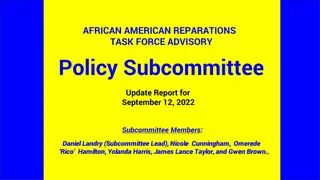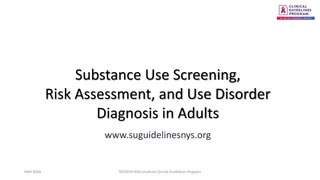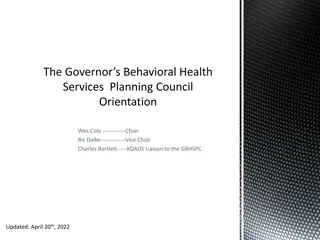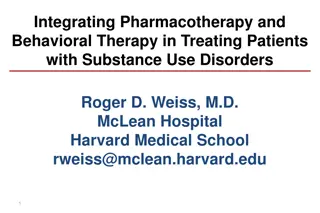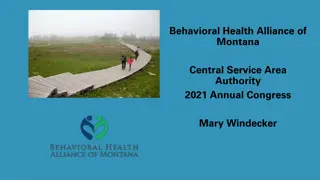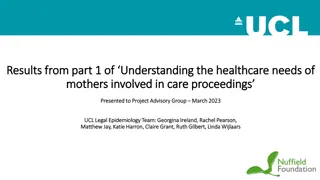Behavioral Health Services for Mental Health and Substance Use in San Francisco
San Francisco Department of Public Health's Division of Behavioral Health Services and their mission to improve access to and effectiveness of mental health and substance use treatment and recovery services. Discover the various programs and resources available to residents, including outpatient and inpatient treatment, medication management, and specialized treatment services.
Download Presentation

Please find below an Image/Link to download the presentation.
The content on the website is provided AS IS for your information and personal use only. It may not be sold, licensed, or shared on other websites without obtaining consent from the author.If you encounter any issues during the download, it is possible that the publisher has removed the file from their server.
You are allowed to download the files provided on this website for personal or commercial use, subject to the condition that they are used lawfully. All files are the property of their respective owners.
The content on the website is provided AS IS for your information and personal use only. It may not be sold, licensed, or shared on other websites without obtaining consent from the author.
E N D
Presentation Transcript
San Francisco Department of Public Health Division of Behavioral Health Services A presentation to Our City, Our Home October 26, 2023 Jessica Brown, MPH Director of the Office of Justice, Equity, Diversity and Inclusion/Mental Health Services Act San Francisco Department of Public Health
San Francisco Landscape Extremely diverse, with persons of color making up 59.8% of the total population. Faces severe crises of mental illness, overdose, homelessness, and housing insecurity each factor exacerbated by the high cost of living and the compounding effects of trauma and systematic racism. In 2020, there were 711 overdose deaths, 61% more than the 441 overdose deaths recorded in 2019 and 220% more than the 222 recorded in 2017. Black/African Americans have four times the rate of overdose deaths than white San Franciscans. One- third of overdose deaths. SF saw a 33% citywide increase in client suicide attempts and a 13% increase in deaths among adult and older adult clients. SF saw a 76% increase in the number of people who are unsheltered and experiencing homelessness between 2010 and 2020, compared to a statewide increase of 31%. ng people who are unhoused
Behavioral Health Services (BHS) BHS offers a full range of specialty behavioral health services provided by a culturally diverse network of community behavioral health programs and private psychiatrists, psychologists and therapists. Mental Health and Substance Use Services include outpatient treatment, inpatient treatment, medication management, linkage services and a large array of more specialized treatment services. Services are available to residents of San Francisco who receive Medi-Cal benefits, San Francisco Health Plan benefits and to residents with limited resources. SF-MHSA is integrated all throughout BHS.
Behavioral Health Services Mission & Vision System Transformation Mission Goals Vision Improve access to and effectiveness of mental health and substance use treatment and recovery services Mental Health SF / Prop C Funding For all San Franciscans to experience mental and emotional well-being and participate meaningfully in the community across lifespans and generations. To provide equitable, effective substance use and mental health care and promote behavioral health and wellness among all San Franciscans. Increase public awareness of where and how to get help for mental health and substance use challenges. CalAIM Expand proactive and low threshold interventions that reduce risky behaviors. EPIC
Mental Health Services Act (MHSA) 5Funding Components: San Francisco s7Service Categories 1. Recovery-Oriented Treatment 2. Mental Health Promotion 3. Peer-to-Peer Support Services 4. Vocational Services 5. Housing for FSP Clients 6. Workforce Development 7. Capital Facilities and Information Technology Community Services & Supports (CSS) Innovation (INN) Prevention and Early Intervention (PEI) Workforce Education and Training (WET) Capital Facilities and Technology Needs (CF/TN)
Integration of JEDI and SF-MHSA Our Office of Justice, Equity, Diversity, and Inclusion (JEDI), formally known as the Office of Equity and Workforce Development, is committed to"leading with race and prioritizing Intersectionality, including sex, gender, sexual orientation, age, class, nationality, language, and ability, theSFDPH BHS OEWD strives to move forward on theContinuum of Becoming an Anti-Racist Multicultural Institution through Dismantling Racism, interrogatingWhite Supremacy Culture, building solidarity between racial groups, and working towards becoming a healing organization in partnership with staff, clients, and communities."
San Francisco MHSA Programs SF MHSA funded 83 programs in FY20-21which served 46,355 unduplicated individuals. Highlights include: 15 12 7 8 9 6 Population-focused Programs Vocational Programs Recovery-Oriented Treatment Programs Capital Facilities & Information Technology Programs Full Service Partnership Programs 4 14 4 Mental Health Promotion & Early Intervention Programs Peer Programs 4 Supporting Housing Programs (~200 units) Innovation Programs BH Workforce Development Programs
Operating from an intersectional lens that centers on dismantling white supremacy in our system Incorporating an anti-racist stance throughout our programs with a focus on addressing anti-Blackness equitably Treating our peers, colleagues, and communities members with respect and integrity, while honoring each of our individualities and intersectionality. Honoring the cultural and linguistic diversity and needs of our staff and consumers BHS/JEDI Commitments Reducing and addressing disparities amongst disenfranchised staff and consumers Empowering our communities by incorporating their voices, needs, and ideas into our programs Supporting staff via ongoing cultural humility/anti-oppression training Working towards being a healing informed system for staff and consumers
OurJEDITeam comprises the Mental Health Services Act, Trauma-InformedSystems, Equity, Staff Wellness, and Workforce Development & Training. ThisJEDIStructure allows us to expand our responsibilitiesin ensuring that equity is embeddedthroughout all of our systems of care.JEDI is responsible for training, staff wellness, language services, community engagement, workforce development, and inter/intradepartmental partnershipsandcoordinates normalizing,organizing, and operationalizing racial equity across all of BHS.Since merging our efforts have expanded. We have accomplished the following: Continuing Support for Existing PEI Programs Implementing Culturally Congregant Innovation Project JEDI Team and Accomplishments Expanding Behavioral Health Services for Black/African Americans and Birthing People Supporting Overdose Prevention Efforts Increasing Diversity of Our Workforce Equity Capacity Building with Leadership Integrating equity principles throughout all of BHS Increasing support for our internships, peer support and vocational programs. Expanding FSP/ICM Services
KEY BHS/JEDI EQUITY INITIATIVES 10
Culturally Congruent Initiatives to Address Racial Disparities Nov. 2023 May 2023 Equity-Based Maternal Health RFP Awarded 16-Week Equity Executive Fellowship $6M/per year RFP in partnership with Maternal Child and Adolescent Health (MCAH) to fundfourcommunity-based organizations to support Black/African American pregnant, perinatal, and postpartum people through mental health care screenings, linkages, and more. Awarded funding: RAMS, Rafiki, Homeless Childrens Network, and UCSF Embrace Program. Training on understanding the roots of racism and bias for BHS leadership team with NY Times Best Seller, Robin DeAngelo, and Assistant Professor at Mayo Clinic School of Medicine, Dante King. Mental Health Services Act (MHSA) Innovation Intervention Universal Talk Therapy Developing and evaluating culturally responsive behavioral health interventions for Black/AfricanAmerican clients at four civil service clinics (OMI, SOMA, TAY, Mission Mental Health: Alternatives Program) Partnership and collaboration with the Human Rights Commission on providing a universaltalk therapy program for Black/African Americans via the UCSF Embrace Program June 2023 Jan. 2024 11
Culturally Congruent Initiatives to Address Racial Disparities Lifting and Empowering Generations of Adults, Children, andYouth (LEGACY) Ajani Program Westside Community Services Black/African American Community Health and Wellness Initiative Homeless Children s Network Ma at Program Transitional Age Youth Engagement and Treatment Black/African American Third Street Youth Center Kuumba Peer Fellowship RAMS-API Collaborative Native American Health Center Gender Health SF IFR Curry Senior Center Fuerte 12
Culturally Congruent Initiatives to Address Overdose Racial Disparities Our goal is to reduce racial disparities in fatal overdoses among Black/African Americans by 30% by 2025. The overdose death rate among Black/African Americans is more than 5-times higher than the citywide rate. Black/African Americans represent just 6% of the population in SF, but 28% of the preliminary overdose deaths in 2023. BHS partners with Whole Person Integrated Care programs (Post Overdose Engagement Team, Street Medicine, health care services in shelters and Permanent Supportive Housing) on overdose prevention initiatives for people experiencing homelessness. Seven Completed & Planned Overdose Prevention Trainings & Education Ella Hill Hutch Community Center; Success Centers; San Francisco State University; Bayview YMCA; Faith-Based Coalition; IT Bookman Center; Booker T Washington 13
Racial Equity Affinity Groups JEDI launched affinity groups for staff who identify as Black/African Americans; Latinx; White; or Asian Pacific Islander to help staff build their capacity on racial equity concepts andpractices Other Workforce Initiatives Addressing Equity Started with the curriculum of Unlearning Racism to help build the capacity for understandingracism. 30+ attendees have joined us so far. Expanding to LGBTQIA and Multiracial groups later this year. Recruitment and Hiring Equity Interventions Prioritizes top 5 classifications with lowest representation of Black/African and Latinx staff e.g., clinicians andmanagers/directors. Includeslived experience desired qualifications, interview questions, response guidelines,and ratings. Includesequitypartners in all phases of the hiring process including interview preparation and interview panels. Includesonboarding warm welcome video and best practices. DPH HR hiringefficiencies to include several BHS equity interventions. 14
Questions? Jessica Brown, MPH Director, Office of Justice, Equity, Diversity and Inclusion /Mental Health Services Act 1380 Howard Street San Francisco, CA 94103 415-255-3963 jessica.n.brown@sfdph.org
